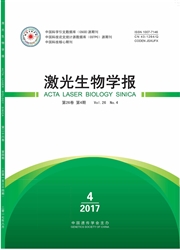

 中文摘要:
中文摘要:
研究大蒜素重要活性成分二烯丙基二硫(Diallyl disulfide,DADS)对荷S180肉瘤小鼠的辐射增敏效应。利用X射线对荷瘤小鼠全身辐照。测量肿瘤体积、重量;检测肿瘤组织中细胞凋亡及Bcl-2、Bax、caspase-3等凋亡因子的表达。同时测定了DADS对S180细胞增殖及细胞内活性氧(reactive oxygen species,ROS)的影响。结果显示:与对照组、单纯药物组及单纯辐照组相比,DADS联合辐照组小鼠的肿瘤体变小、重量减轻(P〈0.01);肿瘤组织中TUNEL阳性细胞增多(P〈0.01);Bax、caspase-3表达增强,而Bcl-2表达减弱。此外,DADS引起了S180细胞内大量ROS的产生。结果提示DADS对荷S180肉瘤小鼠具有辐射增敏效应,其机制与上调Bax、Caspase-3、下调Bcl-2表达及诱导肿瘤细胞产生ROS有关。
 英文摘要:
英文摘要:
To study the radiosensitizer effects of Diallyl disulfide (DADS) on S180 sarcoma-bearing mice. Male Kun-Ming mice were implanted with S180 cell to establish orthotopically transplanted model. Then, the tumor-bearing mice were exposed to whole body irradiation with X-ray. Tumor volume and weight, TUNEL experiment, expression of Bcl-2, Bax, caspase3 were evaluated in treatment versus control. The effects of DADS on the generation of ROS ( reactive oxy- gen species) in intraeellular of S180 cells were measured. The group treated with DADS and irradiation showed signifi- cant reductions in tumor volume and weight( P 〈 0.01 versus control, DADS alone or irradiation alone). Immunohisto- chemical analysis revealed that treatment with DADS and irradiation up-regulated the expression of Bax, caspase3 and down-regulated the expression of Bcl-2 as compared with other groups. The number of TUNEL positive ceils in the group treated with DADS and irradiation is more than control or did treatment with DADS alone or irradiation alone. In vitro, DADS increased ROS production in S180 ceils. These data show that treatment of DADS and irradiation decreased growth of S180 sarcoma through regulating the expression of Bel-2, Bax, caspase3 and induced ROS production.
 同期刊论文项目
同期刊论文项目
 同项目期刊论文
同项目期刊论文
 EARLY EFFECTS OF LOW DOSE C-12(6+) ION OR X-RAY IRRADIATION ON PERIPHERAL BLOOD LYMPHOCYTES OF PATIE
EARLY EFFECTS OF LOW DOSE C-12(6+) ION OR X-RAY IRRADIATION ON PERIPHERAL BLOOD LYMPHOCYTES OF PATIE High-efficiency transfer and expression of AdCMV-p53 in human cervix adenocarcinoma cells induced by
High-efficiency transfer and expression of AdCMV-p53 in human cervix adenocarcinoma cells induced by Protective effects of melatonin against C-12(6+) beam irradiation-induced oxidative stress and DNA i
Protective effects of melatonin against C-12(6+) beam irradiation-induced oxidative stress and DNA i Exogenous melatonin modulates apoptosis in the mouse brain induced by high-LET carbon ion irradiatio
Exogenous melatonin modulates apoptosis in the mouse brain induced by high-LET carbon ion irradiatio Simulated Microgravity Conditions and Carbon Ion Irradiation Induce Spermatogenic Cell Apoptosis and
Simulated Microgravity Conditions and Carbon Ion Irradiation Induce Spermatogenic Cell Apoptosis and Effects of 12C6+ ion radiation and ferulic acid on zebrafish (Danio rerio) embrynic oxidative stress
Effects of 12C6+ ion radiation and ferulic acid on zebrafish (Danio rerio) embrynic oxidative stress Spatial distribution of polygalacturonase-inhibiting proteins in Arabidopsis and their expression in
Spatial distribution of polygalacturonase-inhibiting proteins in Arabidopsis and their expression in Diallyl disulfide enhances carbon ion beams–inducedapoptotic cell death in cervical cancer cells thr
Diallyl disulfide enhances carbon ion beams–inducedapoptotic cell death in cervical cancer cells thr 期刊信息
期刊信息
